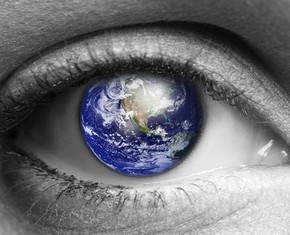The views expressed in our content reflect individual perspectives and do not represent the authoritative views of the Baha'i Faith.
Travelers typically want to see other cultures and taste their unique cuisines, admire their arts, watch their spectacles. Think about it: what’s unique about your culture?
Imagine that your friends from another continent who speak a different language come to visit, and ask you to show them the things that best represent your culture. What would you choose?
I could show them popular events, foods, and places, but I can’t show them my “culture.” Perhaps that’s because our culture lives inside of us, in our attitudes, our philosophies of life, our interests, our shared view of the world.
RELATED: What Is My Identity If Race Isn’t the Deciding Factor?
Abdu’l-Baha told us, in a talk he gave in Paris, that “The reality of man is his thought, not his material body.” We can understand from this simple comment that reality itself isn’t material but spiritual. The same goes for our collectively shared reality, our culture.
As a nineteen-year-old, I went to live in another country, intending to make it my permanent home. The language was foreign, as well as everything else. Even my idea of “American” was different from theirs. I was accustomed to seeing my country as the center of the universe, but they were equally ethnocentric.
All of this confused me, and during a meditation I imagined myself growing up alone on a desert island. With no one to interact with, how would I know if I was kind, generous, honest, or anything else? I felt that my inmost being was the same as ever and realized that being “American” is like a set of clothes worn over my inner spirit, my true self.
So I set out on a long-term project of rectifying my two selves – the “me” that saw herself as an American, and the spirit that represents my true self. Abdu’l-Baha affirmed that with the coming of a new divine messenger, the world of thought is regenerated and “extraordinary progress occurs in minds, thoughts and spirits.”
I value having come to this awareness before I’d completed my formal education in the social sciences because it helped me identify unstated assumptions in research – and in my own culture.
Culture can be seen as a universe of shared meaning. Within any culture, each symbol relates to every other symbol and pervades all aspects – how we think, talk and behave. Culture includes our ideas, practices, experiences, beliefs, norms, and the attitudes that guide our behaviors. Cultures aren’t impervious to change, but they are self-contained. Just as in an English dictionary, where all the definitions refer to others in the same book, so too do other aspects of any culture. For example, the popular sport of American football involves tactical skill, organization, strength and power. It’s a battle between rivals, and its spectacle includes the flag and the national anthem. As we appraise its meaning (no, it’s not “just a game”) we realize how it upholds a belief in power and fortitude that we also associate with what “masculine” is supposed to look like. Cities with a strong winning team are viewed positively, whereas the cities of a losing teams are pitied, bolstering a belief that opposing fans are justified in an attachment to “their” side, sometimes to the extent that they’ll engage in physical fights. We can see these same values reflected in numerous areas of our culture, and observe similar phenomena in other cultures.
Addressing the need for a universal language in a talk he gave in Paris, Abdu’l-Baha said, “I am an Oriental and on this account I am shut out from your thoughts and you likewise from mine.” If we all shared a system that allowed us to understand each other’s frame of reference, we could open up our universe of shared meaning, and begin to appreciate and value other cultures.
RELATED: Babel Revisited: Can a Universal Language Bring World Peace?
We learn, from family, friends, schools, media messages, etc., our shared history and cultural values – which we generally accept as facts, without question. While living abroad, I was startled to meet individuals who laughed at me for brushing my teeth. They told me they never brushed theirs and opened their mouths to display perfect unblemished teeth, whereas mine, they pointed out, were full of fillings. They said they believed it was because of their water quality. I however, come from a place where we view what medical science tells us as true regarding our health. For this and any other topic, we each could come up with evidence from our respective cultures to support our notions, sometimes regarding topics of much greater significance than teeth. For example, Abdu’l-Baha wrote:
… the root cause of prejudice is blind imitation of the past – imitation in religion, in racial attitudes, in national bias, in politics. So long as this aping of the past persisteth, just so long will the foundations of the social order be blown to the four winds, just so long will humanity be continually exposed to direst peril.
God’s spiritual messengers come to reorient and renew our individual thought. Baha’u’llah warned constantly of idle fancies and vain imaginings – thoughts not rooted in spiritual reality, as with many inherited cultural beliefs that pervade our collective consciousness, our symbol system of meanings. This is not to say that everything we collectively believe is bad or wrong, but rather that we must avoid blind imitation:
Arise, O people, and, by the power of God’s might, resolve to gain the victory over your own selves, that haply the whole earth may be freed and sanctified from its servitude to the gods of its idle fancies.
At the beginning of a new religious cycle, those who follow the teachings of the messenger and learn to see with their own eyes and hear with their own ears find ways to detach from notions connected to a material self and focus on developing their spiritual selves.
Consider how often you hear people use a term for the material self – “identity” – as though there’s no question such a thing exists. If you imagine yourself as the only person on that desert island, you might realize, as I did, that our true spirit self, detached from the material world, is our actual identity.
















Comments
Sign in or create an account
Continue with Googleor